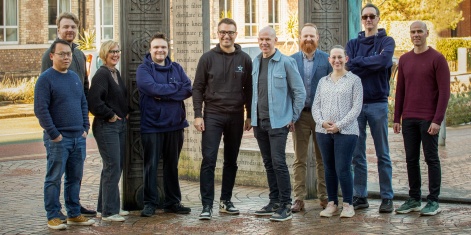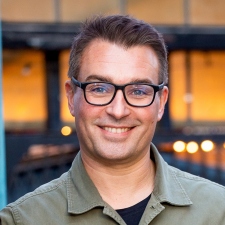Paul Gouge and Alex Rigby are no strangers to starting games companies. Together they’ve founded free-to-play online games developer and publisher BattleMail, acquired by (M)Forma in 2002, followed by Rockpool Games, which was snapped up by Eidos in 2007.
Arguably, they are most famous for founding Playdemic in 2010, the studio behind Golf Clash, which was eventually bought by Warner Bros.-owned TT Games in 2016 for an undisclosed fee, and later acquired by EA for $1.4 billion - making it one of the largest deals in mobile.
While they’ve had repeat successes, the path wasn’t always a clean one. When he was at Playdemic, I first met the studio’s then-CEO Paul Gouge at an event in Birmingham where he showed me the in-development Gang Nations. As polished and impressive as the strategy title looked, Gouge admits “that was a game that should have been killed”.
“That game was a commercial flop,” says Gouge in an interview with PocketGamer.biz, admitting the team was too emotionally attached to the title.
He continues: “We often cite that game as a title that really taught us a lot because we fought all of our instincts on that game. All our instincts said that game should die.
“But we were so emotionally attached to it, and we put so much into it, that we forced our way, we tried to polish our way out of it, and proved to ourselves that you can't.
“So I always look back on that and think that's a game that really proved the point. You know, that if something genuinely, objectively isn't good enough, it just has to die.”
Gang Nations may have been a failure, but two years later, the studio launched Golf Clash, one of the most successful mobile games ever to come out of a UK studio, generating more than $1.2 billion in gross revenue to date, according to AppMagic data.
It’s a lesson driven home by many of the top mobile games developers, such as Supercell, that you should never be afraid to ‘kill your darlings’.
A Forthstar is born
Gouge and Rigby left Playdemic in 2022. After a hattrick of company sales, they are back again with their latest studio: a mobile game developer appropriately named ForthStar. The startup has $10 million in backing from Griffin Gaming Partners - which recently ploughed $100 million into Marvel Snap studio Second Dinner.
Based in Manchester, the studio has hired 14 team members to date, consisting of some ex-colleagues from Playdemic, and is actively recruiting new staff. Gouge anticipates the team could reach around 40 employees over the next couple of years, should the studio become successful.
He admits that 14 developers right now isn’t big enough to create a successful game in the modern market - but it is enough to build a great prototype. In fact, taking away publishing functions, the core team for Golf Clash was around 20 - though the industry has of course evolved since then.
Gouge says the team has learned lots of lessons from the Playdemic days that they hope to bring to ForthStar, having launched both a flop and one of the UK’s biggest success stories within two years of each other.
“Ultimately, it's always about people,” says Gouge. “That's the one thing that, you know, is so true in this journey, is that you can't do anything great without incredible people.”
There are also numerous other lessons of course, learned from Playdemic and their 25+ years in the industry. Gouge reckons ForthStar’s first game is approximately a year out from launch, with the team busy building out the tools and tech to ensure it has the infrastructure needed to release and service a mobile title.

Importantly, he notes they are in not just the testing phase, but adds it’s also the “kill stage”. Gouge says the studio has already killed “quite a few” prototypes, stating there is little point putting concepts into full production “unless you are highly confident” that the idea is compelling enough
But now the team has an idea they think has enough legs to warrant further development - though it could still be ended at any point, as per the company’s mantra.
“If you believe in this mentality, you have to live it and breathe it,” explains Gouge. “You have to kill things that you're not 100% committed to, particularly because the economics don't make sense.
“There's no point bringing something to market that isn't compelling, that isn't going to have high levels of engagement and retention, because it is such a competitive space.”
You have to kill things that you're not 100% committed to, particularly because the economics don't make sense.Paul Gouge
Following their success with Golf Clash at Playdemic, ForthStar currently has its eyes set on further opportunities in the sports genre - though he notes their current title also encompasses other genres too - which Gouge believes still isn’t as well served as other audiences on mobile.
“One of the reasons that Golf Clash was successful was because there weren't a lot of products out there that were catering for that sort of competitive, casual mass market male gamer,” says Gouge.
“And so we think that there is an opportunity still in that space, and that's a very general, large market,” adding: “We think that the mass market male competitive gamer on mobile probably is one that has a little less choice than other markets.”
While Gouge and Rigby have had a history of success, including on mobile, why start a new studio in the space now? Apple’s privacy changes have had a profound impact on the industry, making it a tough time to launch a new game.
Gouge admits the notion that it’s a tough time in mobile isn’t wrong - with many headwinds including user acquisition and other factors such as high interest rates, poor macroeconomic conditions, etc - but people saying it’s a bad time to launch a studio or game is nothing new to him.
“In my experience of being in video games, which is quite a long time, I'm regularly told that this is the hardest time to ever launch a games business,” says Gouge. “So this won't be the first time anyone told me this is a really bad time to start a company.
“What I try to do is not get too caught up in the particular moment that we're in, and think more generally.
“At any particular period, you can zoom into video games and go, oh, this is a really bad time. If you zoom out, and you see the journey of the growth of our industry, of the incredible scale that we now have, I think it is just a massive success story.
“Think back to where we were 20 years ago, the market growth is phenomenal.”
He continues: “What I'm confident about is that the market will continue to grow and that people… I don't see people putting their phones down saying ‘I'm never gonna pick up another phone again’.”
New ways of working
As a modern studio, ForthStar is embracing new ways of working, which includes a hybrid work-from-home and office environment, as well as experimenting with a four-day work week.
The pandemic supercharged the notion of working from home and proved that it’s possible for staff to operate remotely. But the debate continues around the impact of remote working on new game ideation versus full production and live ops, and how efficient and successful those processes are, particularly for the former.
“In my experience of being in video games, which is quite a long time, I'm regularly told that this is the hardest time to ever launch a games business.Paul Gouge
“I think the creative endeavour, particularly at the beginning when you're doing lots of prototyping, that very rapid iteration when you're bouncing ideas off each other, I 100% believe that happens much better at this sole location,” says Gouge.
“I think having people co-located in a space, who ideally have worked together for many years and understand each other's quirks, strengths, talents and weaknesses, that I think is the best melting pot for great creativity.”
He states, however, that once there is a certain level of understanding and experience in a product, things get a little bit easier with hybrid working. On top of that, Gouge says that, in 2024, studios simply have to offer a flexible environment to attract high quality talent.
When it comes to a four date week, Gouge sought advice from other studios, like Hutch Games, and says that experimenting with this approach comes from trying to create the best possible environment for people to make games.
While it’s still a trial for the studio, Gouge says it’s their belief that, done right, teams can get as much, if not more, productivity out of four days as they can from five.
“It creates the really important added benefit of a much better work/life balance for people that allows that high level of productivity,” he states.
Ultimately, Gouge says that ForthStar’s ambition is to create games that millions of people can enjoy, and that starts from creating a great company.
“The organisation that is enabling that invariably has to be healthy,” he explains. “It has to be collaborative, it has to be innovative and it has to have really incredible people in it. And that makes it a real joy to be involved in”
Can lightning strike for a fourth time? Gouge certainly thinks so.
Gouge is a speaker at Pocket Gamer Connects London 2024. He’s on the Brightest Britain panel today, which also features other UK games industry heavyweights Tripledot Studios co-founder and president Akin Babayigit, Trailmix CEO and co-founder Carolin Krenzer, London & Partners head of creative Louise Conolly-Smith, Hiro Capital co-founding partner and Games Workshop co-founder Ian Livingstone, and UKIE CCO Sam Collins.






















